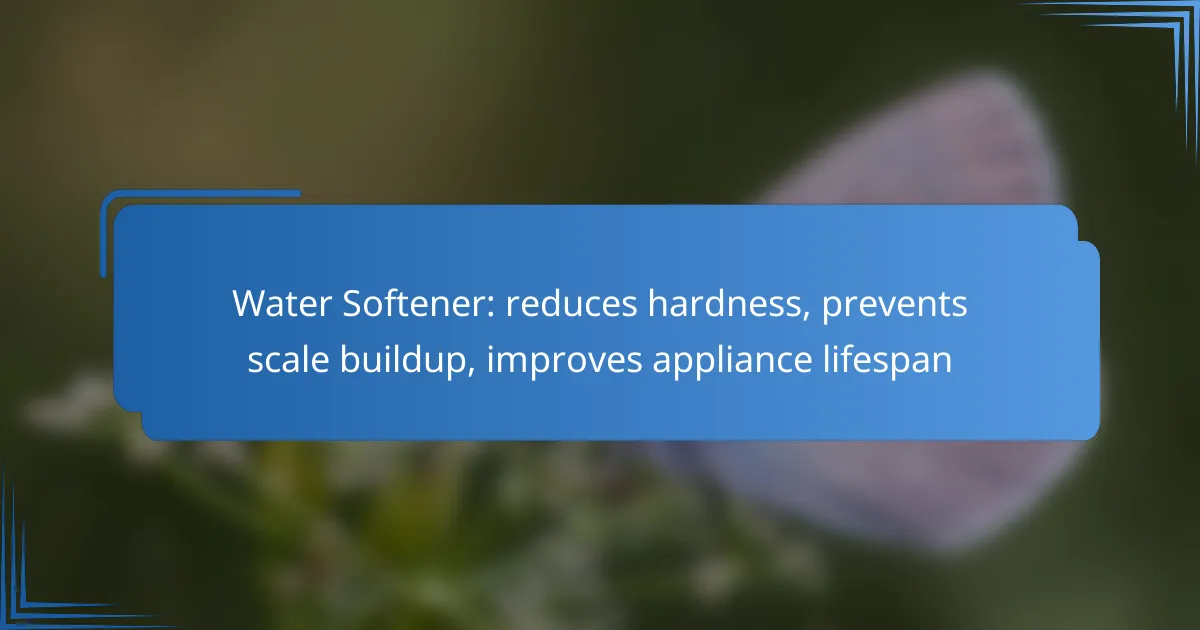A water softener is an essential appliance that reduces water hardness by removing minerals such as calcium and magnesium, which are responsible for scale buildup. By improving water quality, it not only enhances the efficiency of daily tasks but also significantly extends the lifespan of water-using appliances.
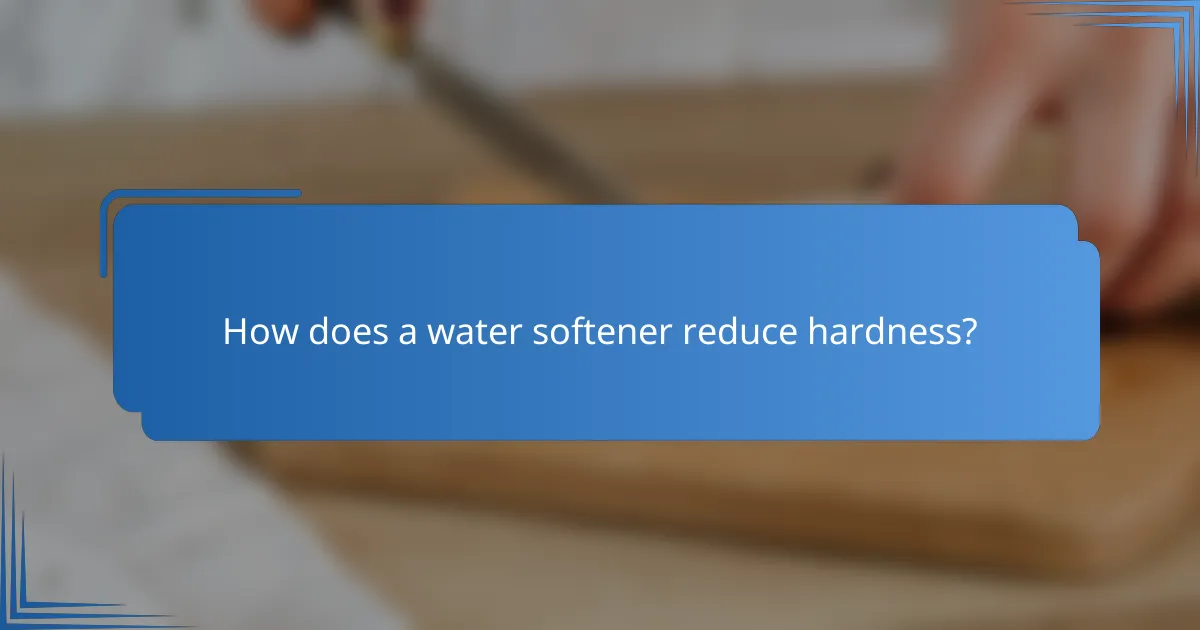
How does a water softener reduce hardness?
A water softener reduces hardness by removing minerals like calcium and magnesium that cause scale buildup. This process not only improves water quality but also extends the lifespan of appliances that use water.
Ion exchange process
The ion exchange process is the primary mechanism by which water softeners operate. In this process, hard water passes through a resin bed that contains sodium ions. As the hard water flows through, calcium and magnesium ions are exchanged for sodium ions, effectively softening the water.
This method is efficient and can handle varying levels of water hardness, making it suitable for many households. Regular maintenance, including resin replacement and salt replenishment, is necessary to ensure optimal performance.
Replacement of calcium and magnesium
Water softeners specifically target calcium and magnesium ions, which are responsible for water hardness. When these minerals are replaced with sodium ions, the water becomes softer and less likely to form scale deposits in pipes and appliances.
This replacement process not only improves the efficiency of water heaters and dishwashers but also reduces the frequency of cleaning and maintenance required to remove scale buildup. Households can expect a noticeable difference in the performance of their appliances.
Improved water quality
Softened water enhances overall water quality, making it more suitable for various household tasks. It leads to better lathering of soaps and detergents, which can improve cleaning efficiency and reduce the amount of product needed.
Additionally, using soft water can result in softer skin and hair after bathing, as it does not leave behind the harsh mineral residues associated with hard water. Overall, the transition to softened water can lead to a more pleasant and effective water usage experience.
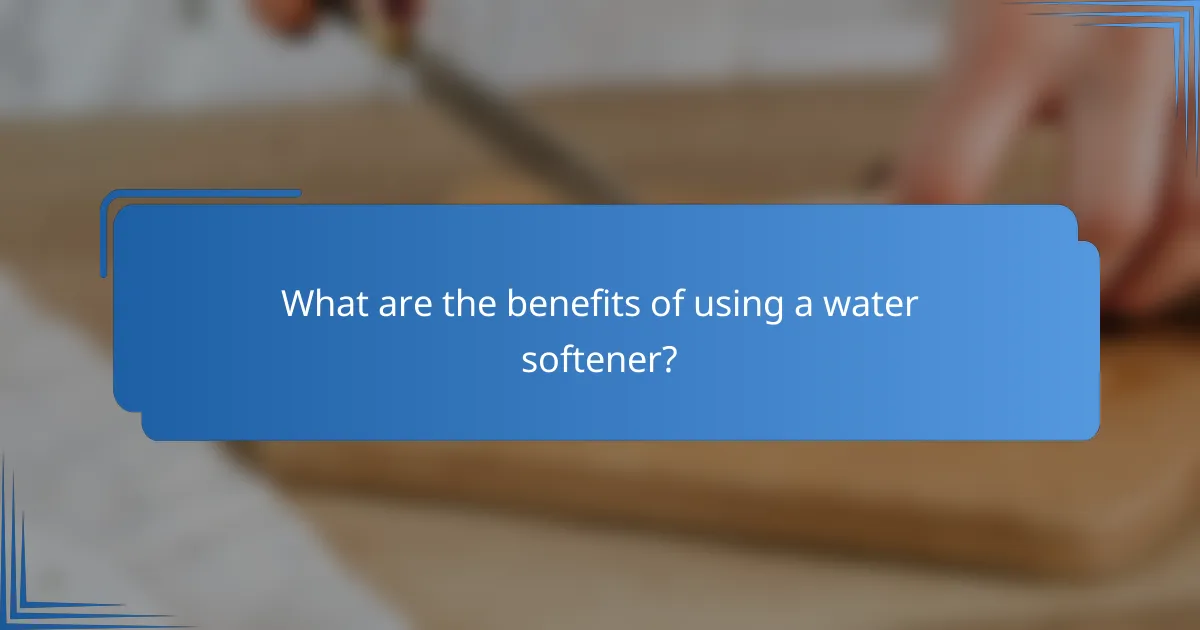
What are the benefits of using a water softener?
A water softener provides several key benefits, including reducing hardness, preventing scale buildup, and improving the lifespan of appliances. By removing minerals like calcium and magnesium, it enhances water quality and efficiency in daily tasks.
Prevents scale buildup
Water softeners effectively prevent scale buildup in pipes, faucets, and appliances. Hard water contains minerals that can accumulate over time, leading to clogs and reduced water flow. By softening the water, these systems minimize mineral deposits, ensuring smoother operation and less maintenance.
Regular use of a water softener can significantly reduce the frequency of plumbing issues related to scale. Homeowners may notice clearer water and improved performance in dishwashers and water heaters, which can save on repair costs.
Extends appliance lifespan
Using a water softener can extend the lifespan of household appliances that use water. Appliances like dishwashers, washing machines, and water heaters are less likely to suffer from wear and tear caused by mineral buildup. This can lead to fewer replacements and repairs over time.
For instance, a water heater operating with softened water may last several years longer than one using hard water. Homeowners can expect to see a return on investment through reduced appliance replacement costs and improved efficiency.
Improves soap efficiency
Water softeners enhance the efficiency of soaps and detergents, allowing them to work more effectively. Softened water allows soaps to lather better and rinse off more easily, which can lead to cleaner dishes and laundry with less product usage.
As a result, households may find they need to purchase fewer cleaning products, leading to cost savings. Additionally, using less soap can reduce environmental impact, making water softeners a practical choice for eco-conscious consumers.
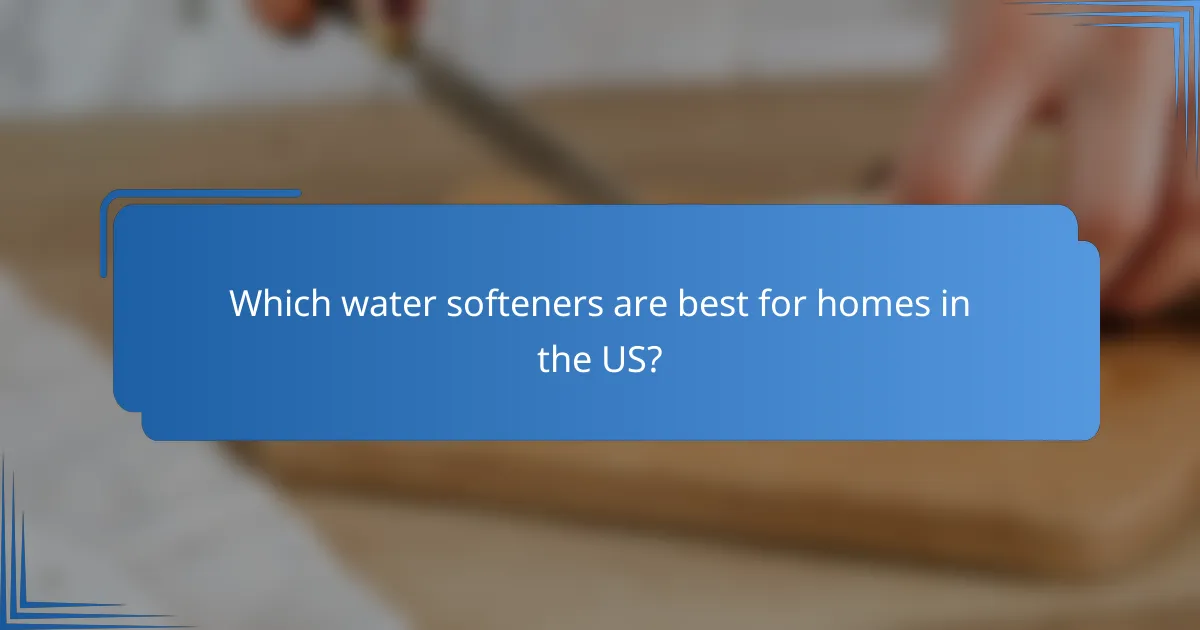
Which water softeners are best for homes in the US?
Some of the best water softeners for homes in the US include the Fleck 5600SXT, WaterBoss 220, and EcoWater ECR3700. These models effectively reduce hardness, prevent scale buildup, and enhance the lifespan of appliances.
Fleck 5600SXT
The Fleck 5600SXT is a popular choice due to its advanced digital control head, which allows for easy programming and monitoring. It uses a metered regeneration process, ensuring that salt and water are used efficiently based on your household’s water usage.
Consider its capacity, which typically ranges from 48,000 to 64,000 grains, making it suitable for medium to large households. Regular maintenance is straightforward, but be mindful to check the salt levels periodically to ensure optimal performance.
WaterBoss 220
The WaterBoss 220 is designed for smaller homes or apartments, with a compact size and a grain capacity of about 22,000. It features a built-in filter that can handle both hardness and iron, making it versatile for various water quality issues.
This model is efficient, using less salt and water compared to traditional softeners. However, it may require more frequent salt refills, so plan accordingly to avoid running out during peak usage times.
EcoWater ECR3700
The EcoWater ECR3700 stands out for its eco-friendly design, utilizing a dual-tank system that allows for continuous soft water supply. It has a grain capacity of around 30,000, making it suitable for average-sized households.
This model incorporates smart technology to adjust its regeneration cycle based on water usage patterns, which can lead to significant savings on salt and water. Ensure you have adequate space for installation, as its dual-tank system requires more room than single-tank models.
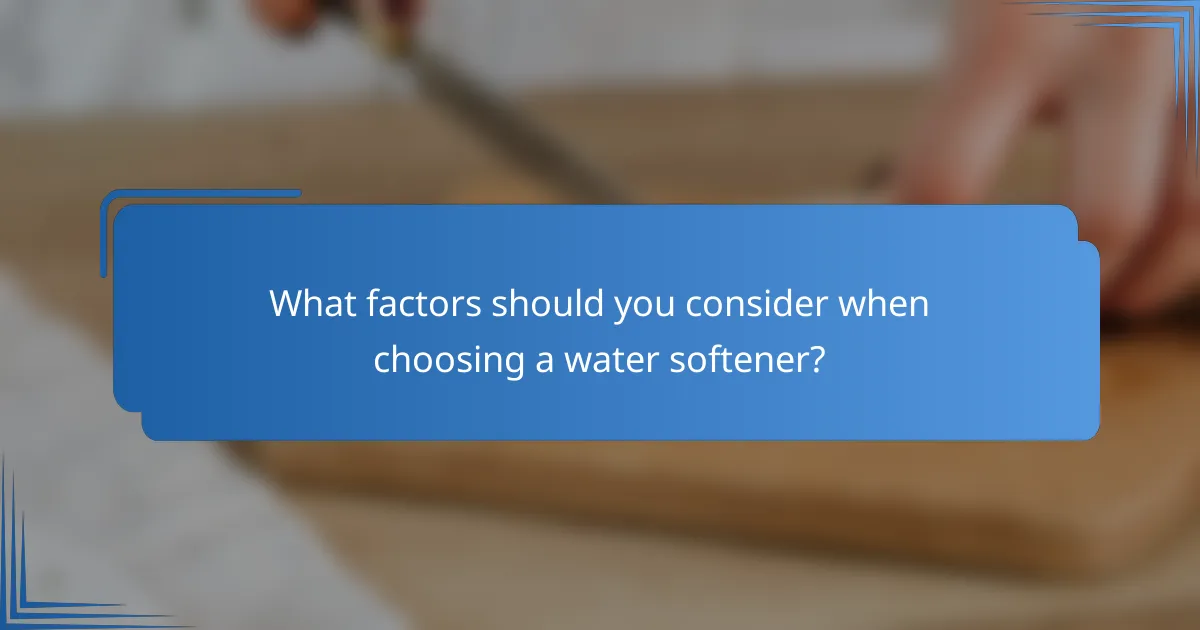
What factors should you consider when choosing a water softener?
When selecting a water softener, consider factors such as water hardness level, household size, and regeneration type. These elements will help you determine the most suitable system for your needs, ensuring effective hardness reduction and optimal appliance lifespan.
Water hardness level
Understanding your water hardness level is crucial when choosing a water softener. Water hardness is typically measured in grains per gallon (gpg) or parts per million (ppm), with levels above 7 gpg generally considered hard. You can test your water using a home testing kit or by contacting your local water supplier for a report.
Once you know your hardness level, select a softener that can handle your specific water conditions. Systems are designed for varying hardness levels, so ensure the unit you choose is capable of effectively reducing the hardness in your water supply.
Household size
Your household size directly impacts the water softener capacity you need. Larger households typically require units with higher grain capacities to meet daily water usage demands. For example, a family of four may need a softener with a capacity of 30,000 to 40,000 grains, while a single-person household might only require a 20,000-grain model.
Consider your daily water consumption and peak usage times when selecting a system. This will help ensure that your water softener can provide a consistent supply of softened water without running out during high-demand periods.
Regeneration type
Water softeners utilize different regeneration types, which can affect efficiency and operating costs. The two main types are time-initiated and demand-initiated regeneration. Time-initiated systems regenerate at set intervals, regardless of water usage, while demand-initiated systems regenerate based on actual water consumption.
Demand-initiated systems are often more efficient, as they minimize water and salt usage by regenerating only when necessary. However, they may come at a higher initial cost. Evaluate your budget and preferences to choose the regeneration type that best suits your household needs.
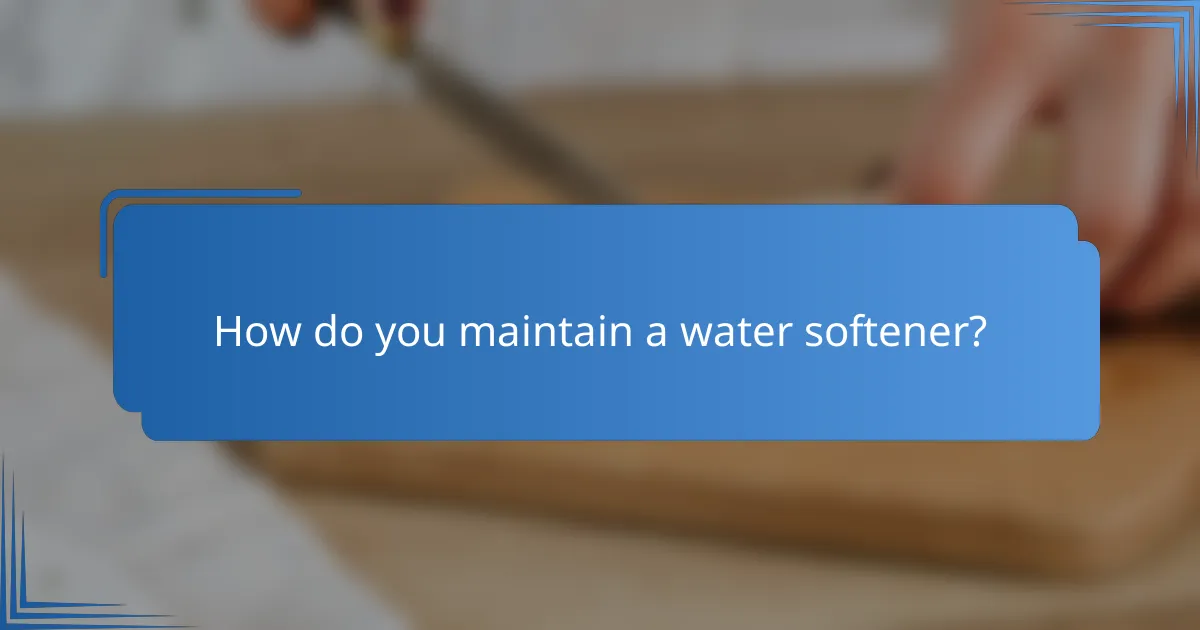
How do you maintain a water softener?
Maintaining a water softener is essential for ensuring its efficiency and longevity. Regular upkeep involves tasks such as replenishing salt, cleaning the resin tank, and monitoring water quality to prevent issues like scale buildup.
Regular salt replenishment
Regularly adding salt to your water softener is crucial for its operation. The salt facilitates the ion exchange process that removes hardness minerals from the water. Check the salt level monthly and refill it when it drops below a quarter of the tank’s capacity.
Use high-quality salt designed for water softeners to avoid clogs and maintain efficiency. Depending on your water hardness and usage, you may need to replenish salt every few weeks to months.
Cleaning the resin tank
Cleaning the resin tank helps maintain the effectiveness of the water softener. Over time, resin beads can accumulate dirt and minerals, which can hinder performance. It’s advisable to clean the tank at least once a year.
To clean the resin tank, follow the manufacturer’s instructions. This often involves using a resin cleaner and flushing the system to remove debris. Ensure the system is off and depressurized before starting the cleaning process.
Monitoring water quality
Regularly testing your water quality is vital to ensure the water softener is functioning correctly. You should check for hardness levels and any signs of scale buildup in your appliances. Testing can be done using home test kits or by sending samples to a laboratory.
Monitoring water quality helps you identify when to adjust the salt dosage or clean the system. Aim to test your water every few months or after any significant changes in water usage or quality.
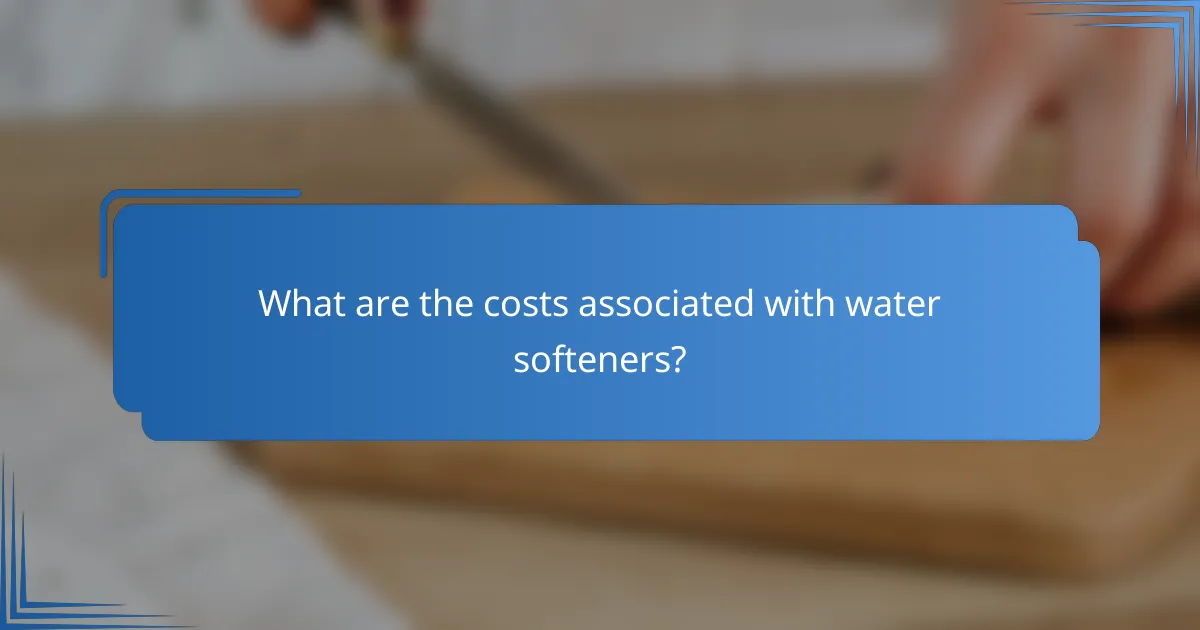
What are the costs associated with water softeners?
The costs associated with water softeners can vary widely based on factors such as type, brand, and installation requirements. Generally, you can expect to invest in both the initial purchase and ongoing maintenance costs.
Initial purchase price
The initial purchase price of a water softener typically ranges from a few hundred to several thousand dollars. Basic models may start around $400, while high-end systems can exceed $2,000 depending on features and capacity.
When selecting a water softener, consider factors like the size of your household and water hardness levels. A larger unit may be necessary for bigger families or homes with high mineral content in the water, which can increase the upfront cost.
It’s also important to factor in potential installation fees, which can add another $100 to $500 to your total expense. Some retailers offer free installation with the purchase of certain models, so it’s worth comparing options.
